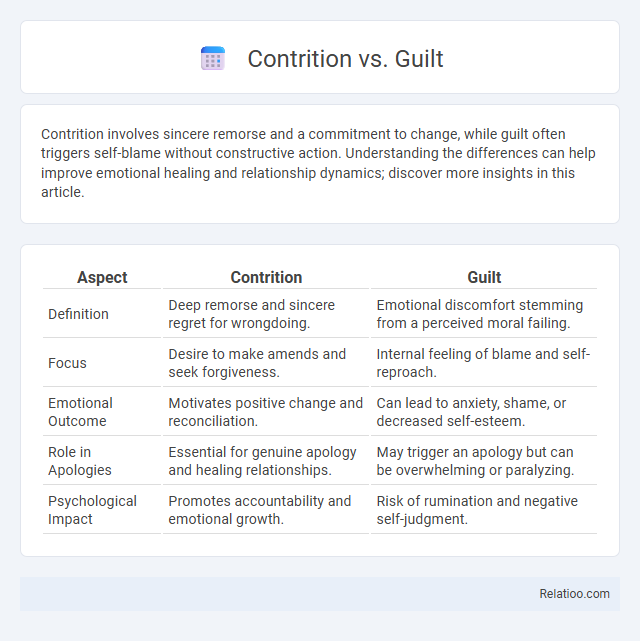Contrition involves sincere remorse and a commitment to change, while guilt often triggers self-blame without constructive action. Understanding the differences can help improve emotional healing and relationship dynamics; discover more insights in this article.
Table of Comparison
| Aspect | Contrition | Guilt |
|---|---|---|
| Definition | Deep remorse and sincere regret for wrongdoing. | Emotional discomfort stemming from a perceived moral failing. |
| Focus | Desire to make amends and seek forgiveness. | Internal feeling of blame and self-reproach. |
| Emotional Outcome | Motivates positive change and reconciliation. | Can lead to anxiety, shame, or decreased self-esteem. |
| Role in Apologies | Essential for genuine apology and healing relationships. | May trigger an apology but can be overwhelming or paralyzing. |
| Psychological Impact | Promotes accountability and emotional growth. | Risk of rumination and negative self-judgment. |
Understanding Contrition and Guilt
Contrition involves a deep, sincere remorse for wrongdoing, motivating a genuine desire to make amends, while guilt is primarily an emotional response to having violated personal or societal standards. Understanding contrition requires recognizing its transformative power that leads to personal growth and reconciliation, contrasting with guilt, which can sometimes result in lingering self-reproach or shame without positive change. Differentiating these concepts is crucial in psychological healing and moral development, as contrition fosters responsibility and restitution, whereas guilt may hinder progress if unresolved.
Defining Contrition: A Deeper Look
Contrition is a profound and sincere feeling of remorse for wrongdoing, distinct from guilt which often involves a more general sense of responsibility or regret. It emphasizes heartfelt repentance and a genuine desire to make amends, going beyond mere acknowledgment of fault. Understanding contrition enables you to engage in true moral reflection and seek meaningful forgiveness.
What is Guilt? Key Characteristics
Guilt is an emotional experience that arises when Your actions violate personal or societal moral standards, leading to feelings of remorse and responsibility. Key characteristics of guilt include self-awareness, a sense of wrongdoing, and a desire to make amends or seek forgiveness. Unlike contrition, which emphasizes sincere sorrow and repentance, guilt primarily reflects the internal acknowledgment of having caused harm or offense.
Contrition vs Guilt: Core Differences
Contrition refers to a sincere, heartfelt remorse for wrongdoing combined with a genuine desire to make amends, while guilt is primarily an emotional response characterized by feelings of blame or responsibility for a specific action. Unlike guilt, which may be experienced superficially or temporarily, contrition involves deeper moral reflection and commitment to change behavior. Understanding the distinction between contrition and guilt is crucial in psychological counseling, religious repentance, and restorative justice practices.
Emotional Impact of Contrition and Guilt
Contrition and guilt both arise from recognizing wrongdoing, but contrition involves sincere remorse and a genuine desire to make amends, often leading to personal growth and emotional relief. Guilt tends to weigh heavily on Your conscience, causing stress, self-reproach, and sometimes stagnation when it is not resolved or expressed constructively. Understanding the emotional impact of these feelings helps you navigate healing by transforming guilt into contrition, fostering empathy and emotional balance.
Psychological Roots of Contrition and Guilt
Contrition and guilt both stem from psychological processes related to moral awareness, but contrition arises from genuine remorse and a desire to make amends, while guilt often involves self-blame and regret over wrongdoing. Your emotional response of contrition is linked to empathy and the acknowledgment of harm caused to others, driving positive behavioral change. In contrast, guilt can sometimes lead to negative self-judgment and anxiety, reflecting deeper internal conflicts within the psyche.
How Contrition Leads to Positive Change
Contrition involves sincere remorse for wrongdoing, motivating individuals toward self-improvement and positive behavioral change. Unlike guilt, which often leads to feelings of worthlessness or stagnation, contrition fosters accountability and proactive steps to repair harm. This genuine sense of regret encourages reflection and growth, ultimately resulting in healthier relationships and personal development.
Guilt and Its Role in Personal Growth
Guilt serves as a powerful emotional signal that prompts introspection and motivates you to make amends for wrongdoings. Unlike contrition, which involves sincere remorse and a commitment to change, guilt can sometimes lead to stagnation if not managed constructively. Understanding the distinction enhances emotional intelligence and fosters personal growth by transforming guilt into a catalyst for positive behavior and self-improvement.
Overcoming Guilt: Steps Toward Contrition
Overcoming guilt involves acknowledging the wrongdoing and taking responsibility, which lays the foundation for genuine contrition. Contrition goes beyond guilt by encompassing sincere remorse and a commitment to change, facilitating emotional healing and personal growth. Practical steps toward contrition include self-reflection, seeking forgiveness, and making amends to restore integrity and inner peace.
Contrition and Guilt in Religious and Cultural Contexts
Contrition in religious contexts emphasizes sincere remorse and a heartfelt desire for forgiveness, often viewed as a necessary step for spiritual reconciliation and redemption. Guilt, culturally, reflects the emotional experience arising from recognizing wrongdoing, which motivates ethical self-reflection but may not always involve spiritual elements. Religious traditions prioritize contrition as a transformative process, while guilt functions as a psychological response that varies across cultural norms and moral frameworks.

Infographic: Contrition vs Guilt
 relatioo.com
relatioo.com